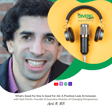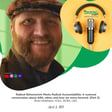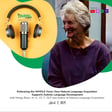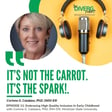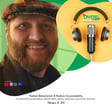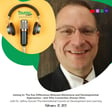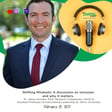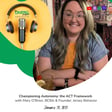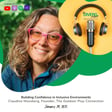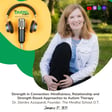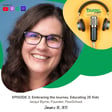Introduction to PDA and Autism
00:00:00
Speaker
me everything and anything that's happened in the disability world. um It started with a mom who wouldn't take no for an answer. And I'd been working in autism and I'm working with this family and she stumbled across PDA and said, well, you know, you heard about PDA. And I'm like, yeah, I heard ah about it once or twice. I just never really paid attention. She was like, you have to pay attention.
00:00:25
Speaker
And she sent me article after article after article until I did pay attention. And i was fascinated because I had been doing a bunch of assessments on kids in Chicago with trauma histories.
00:00:41
Speaker
And I had been recommending all kinds of creative support um strategies or approaches. And when i read, finally, the PDA literature, they were talking about the same kind of approach.
00:00:58
Speaker
Just they were doing it better. And just the combination of autism and trauma, for me, it was just so fascinating. And thought, oh, I know these kids.
00:01:10
Speaker
Welcome to the Diverge podcast, inclusive of autistic and other neurodivergent voices. We exist to bridge the gap between specialized knowledge and everyday parenting.
00:01:26
Speaker
championing neuroaffirming and developmentally based approaches to therapy, education, and life. Designed for parents, educators, friends, and allies. Conversation by conversation, insight by insight, we are building community and making space for all kinds of minds.
Meet Diane Gould and PDA North America
00:01:44
Speaker
Hi, everyone. Welcome to the Diverge podcast. Today, we are chatting with Diane Gould of PDA North America. She is a quite licensed clinical social worker and also the executive director of PDA North America.
00:01:55
Speaker
I first met Diane a couple of years ago when I was looking to see what educational accommodations might look like. for a child with PDA, especially in like early elementary. um And I found her to be so resourceful and insightful and a bit of a truth teller in the in that most of the things that she told me would happen, um did actually. And as a result, thanks to her transparency, I was able to navigate some of those very sticky next steps with a little bit more confidence and a little bit less fear and trepidation. So Really excited to chat with her. i think she's an amazing resource.
00:02:31
Speaker
If you are already super familiar with PDA, I do want to make sure um that we talk a little bit about PDA North America and the work that they do. Because in addition to being filled with resources and insight, they are also...
00:02:43
Speaker
very much trying to build community and allyship around PDA. And for those of you who are traveling this road, you know that it can be kind of lonely and there are a lot of naysayers to go up against.
00:02:55
Speaker
So it really helps to have sort of that foundation. And I think PDA North America does a wonderful job building that. So I'm going to let Diane introduce herself and give a little bit more of her background, but I'm really excited for this conversation.
00:03:09
Speaker
Diane, thanks for joining us on the podcast. Thanks. So I'm Diane Gould. I um have a private practice. Outside of Chicago, I'm a clinical social worker.
00:03:22
Speaker
I'm the founder and executive director of PDA North America. And we became a nonprofit a couple of years ago. And hopefully we'll talk a little bit more about that.
00:03:35
Speaker
um What else about me? I was diagnosed autistic about two weeks shy of my 66th birthday. So talk about late diagnosis.
00:03:47
Speaker
And I've worked in schools and for private agencies over the years. That's amazing. um The late diagnosis piece is really interesting. We'll come back to that. All right.
00:03:59
Speaker
I love that. um So tell us a little bit about what inspired you to focus specifically on PDA.
Understanding PDA and Trauma
00:04:07
Speaker
I think like anything everything and anything that's happened in the disability world.
00:04:14
Speaker
um It started with a mom who wouldn't take no for an answer. And I'd been working in autism and I'm working with this family and she stumbled across PDA and said, well, you know, you heard about PDA and I'm like, yeah, I heard ah about it once or twice. I just never really paid attention. She like, you have to pay attention.
00:04:34
Speaker
And she sent me article after article after article until I did pay attention. And i was fascinated because I had been doing a bunch of assessments on kids in Chicago with trauma histories.
00:04:50
Speaker
And i had been recommending all kinds of creative support um strategies or approaches And when I read finally the PDA literature, they were talking about the same kind of approach, just they were doing it better.
00:05:09
Speaker
And just the combination of autism and trauma for me it was just so fascinating. And I thought, oh, I know these kids. And um I got just very
Evolving Discussions on PDA
00:05:21
Speaker
interested and thought, all right, I need to no more. And when I started talking about PDA in 2019 and start talking to families, there was no turning back.
00:05:34
Speaker
That's amazing. Um, So one of the things I find, you know, when PDA comes into the conversation and you're coming from ah more traditional lens of autism yeah is that there are people and professionals, usually very well intended, who champion more developmentally based therapies, who get very nervous about throwing another label into the mix.
00:05:58
Speaker
Yes. What would you say to that? You know, a few things. I mean, I'm not a huge label person. i wasn't even a big diagnosis person until I got into PDA.
00:06:11
Speaker
And now feel that it is important to have an understanding of kind of the profile and of autism because just trauma-informed isn't enough without understanding neurodivergence.
00:06:32
Speaker
For me, the important thing about kind of putting PDA in the mix is it's helpful sometimes for individuals, especially ones who have been working for a long time in the field of autism.
PDA's Role in Autism Perspectives
00:06:49
Speaker
It's important for them to have PDA um in conversation to expand how they view autism and autistic people. i think that's one of the the beauties of PDA is that it helps people look at autism more accurately and more nuanced.
00:07:07
Speaker
and You know, I think both are best looked at as differences in nervous systems. And that's you know what autism really is. PDA-ers have a highly sensitive nervous system.
00:07:24
Speaker
Correct. Yeah. And that's kind of what it came back to just in my own personal journey. I had a very young son who had been put into what is ah considered a very typical traditional autism program in a public school here in New Jersey.
00:07:36
Speaker
And when push came to shove, when they were like, oh, he's great with routine, but we don't really know how to teach him anything. And then when he moved into kindergarten and behavioral issues that had never been a problem before started popping up, the only thing I had was anxiety.
00:07:50
Speaker
this kid is like looking for control because he doesn't feel safe. And PDA was really the only thing that explained that. and a couple And a couple of other things that aren't typical to autism. Like he he loves to role play like different things like that. So it really became a lifeline in many ways.
00:08:07
Speaker
Absolutely. And that's what we're trying to do is build community, build understanding because it can be really confusing because it's, you know,
00:08:18
Speaker
we want kids to have the autism diagnosis, but everything you think you're supposed to do for an autistic kid isn't going to work for your, your child and might make things worse. So you need kind of this other lens and, and what, you know, what's so important, I think about PDA and being recognized and understood is the kids are so similar. their teens are so similar. The adults are so similar we can and you know, that,
00:08:47
Speaker
to me speaks to, yep, this is something. This is a thing. This a thing. What you see to parents um who are in
Challenges and Support for High Needs
00:08:56
Speaker
the more unique position? So I have a child who is still what would be classified, minimally speaking, if I sent him into a public environment.
00:09:05
Speaker
And so a lot of times it's really hard to get at the function of a behavior correctly. Right. And that becomes a bit of a struggle because when you turn to the PDA community, most of the kids,
00:09:17
Speaker
that where the diagnosis is known tend to be a lot more verbal they tend to be in gen ed environments um are you seeing more pda recognized um in higher support needs what is that journey looking like yeah so two things i want to say i'm going to start with the easier one which is after like um decades of drinking the Kool-Aid and in fact, I even became a BCBA and quit being a BCBA.
00:09:48
Speaker
Um, i I've come to realize that the functional behavioral approach doesn't work.
00:09:59
Speaker
There is no function. I mean, safety, safety of the nervous system. But that doesn't fit one of those boxes. So when people are looking for kind of the function of the behavior that's going in the wrong direction.
00:10:13
Speaker
Right. um The other part is I think we're still just really learning. And at the beginning stages of learning about kids with higher support needs and non-speaking and less speaking PDA-ers.
00:10:33
Speaker
It's something i think we need to learn more about. We need to do a better job at figuring out, i mean, these kids are communicating through their behavior. We need to recognize kind of what their needs are.
00:10:54
Speaker
and um, And it's, you know, both ways, I think it's still on the adults, both ways being kids who, you know, are highly verbal and kids that aren't, like it still needs to be on the adults to figure out what they need to feel safe.
00:11:16
Speaker
Right. And that um co-regulation and that connection need is there whether someone asks for it or not.
00:11:29
Speaker
That's what these kids need. Well, and that's so much of what I found is that to an extent when I, cause we homeschool my son now. yeah um And so we've found a community of ah friends who one runs nature school, does things.
00:11:43
Speaker
Most of them have typical kids. There's a lot of you know neurotypical kids that run through the program, but the baseline understanding of kids and behavior is behavior is unmet needs. So my son fits in so seamlessly into those environments because everyone's looking for the same thing.
00:12:01
Speaker
Yes. There's that like value in being able to attune to a kid. Absolutely. Yeah. I'm not great at articulating like X, Y, Z is going on with my son. So it doesn't always turn into a combination.
00:12:14
Speaker
ah But there's something about being able to tune into a kid. You really quickly start to learn like, oh, that's what's actually triggering. Right. Yeah. Right. Right. Because, you know, our current behavioral approaches are really just keyed into the last straw, the last thing that happens, not an unmet need.
00:12:35
Speaker
Or is something that built up over time. Yes. Yes. I walked in the door and not for nothing, but I haven't felt in control since five o'clock this morning. Right. Absolutely. Absolutely.
PDA North America's Role and Resources
00:12:47
Speaker
absolutely oh that's on But it's fabulous. You found a community. and And that's what's so hard, too, is almost these communities need to be stumbled upon.
00:12:58
Speaker
Yes. Yeah. Well, there's no real rule book. Right. um And one of the reasons, you know, I wanted to start this podcast, which is what I found is similar to what you, you found in your journey is that when you step outside of the system, that's handed to you, everyone's saying the same thing. Yeah.
00:13:16
Speaker
But nobody's like really putting all the pieces together. So unless you go digging and have some decent pattern recognition skills, you're kind your Yeah. Yeah, and that's why you know i started PDA North America because – thought I thought, all right, we need a place. Like we need to put all these things that people are finding together. So we have this provider list and now we've started like a school list and resources and just so each family doesn't have to do so much on their own. Yeah. It's still, there's still so much work that has be done. There's always much work. Yeah. Cause there's no like one size fits all. Right. Well, absolutely. yeah And then on the PDA North America front, we're fortunate we can homeschool, right? We can invent our own program, so to speak, but not everybody can. So do you want to speak to some of the resources you have for parents who are dealing with IEPs and school districts?
00:14:16
Speaker
Sure. I mean, we have downloadable resources. We are, I go to IEP meetings every week with families as part of my private practice. um I have to work really hard to regulate myself during them.
00:14:33
Speaker
ah We are going to launch this spring, hopefully, knocking on fake wood, a school-based training that schools can buy. be self-paced. They can you know buy the package. It will have training.
00:14:52
Speaker
And hopefully so schools will buy it and use it. It's going to probably come down to parents pushing and being the squeaky wheel because that's what it always comes down to. Yeah, we got left these days.
00:15:08
Speaker
Yes. I mean, I do lots of trainings to school now, so schools around the country, some because the schools actually want to learn more. And happen to have a parent who guided them and some who don't want to learn, but just want tell the parents they've done this.
00:15:27
Speaker
Right. No, that makes sense. And what would you say takeaway wise for schools kind of, are there like two or three biggest factors educators need to understand and implement?
Educational Approaches for PDA
00:15:40
Speaker
I think so. i So my head, one of the big ones is that like school and learning aren't synonymous.
00:15:55
Speaker
Like we want kids to learn and be engaged with learning. Like that should be the goal. So much of school is just about compliance.
00:16:08
Speaker
yeah And I think that gets in the way. So if we can agree on, we want kids engaged and to learn. And that can take lots of forms. It usually doesn't take the form of worksheets.
00:16:23
Speaker
Right. um But it can, and generally PDA kids are really interested in a lot of things. That is true. Yes. So, so figuring out how to engage PDA isn't that hard, but it might look differently.
00:16:41
Speaker
i think, I think the other big takeaway it's, all about the relationships. It's all about connection. And there can't be any learning without that co-regulation and connection because that is what keeps the nervous system safe and regulated.
00:17:02
Speaker
And you have to feel safe and regulated to be able to learn. um I think one of the, probably the the more controversial things I talk about with schools is I think people should be able to opt out even young kids.
00:17:21
Speaker
Yeah. You know, like, all right, Hey, if this isn't working for you today, all right, what, what can we figure out instead? Right. Yeah. And you'll find, know more in self-contained classrooms, the, the rare gem of a special education teacher who will say if they don't have it in them, they don't have it in them. Yeah. i love that. Yeah. But I think it's,
00:17:41
Speaker
there's so much fear life. It's opt out. That's the thing I run into is there's always this, you know sort of awfulizing of the future. Well, what if they never want to do x y or z Right. um That's where I think it gets really tricky.
00:17:59
Speaker
So I think there's fear of the future and fear that if we grant kids autonomy in the classroom, there will be anarchy. Yes. You know,
00:18:11
Speaker
um And that everyone will want to opt out or everyone will want this right gave it to one student. Which is really interesting when you think about it, because it's like, well, if everyone wants anarchy and that's what happens, maybe there's something wrong with the system to start with. But at the end of the day, we all want like tribe and community. And when kids can't do well, they do do well.
00:18:35
Speaker
Right. Yeah. Yeah. I agree. fine But I do think
Individual Needs in PDA Contexts
00:18:42
Speaker
it's possible. I think there also needs to be an understanding, you know, who that child is and all the other things that the child has to navigate in the building from a sensory perspective, from a social perspective, from, you know, just getting out the door to school.
00:19:00
Speaker
i mean, there's so much that they're dealing with. So, so sometimes, you know, when, um, and I'm told, which probably happens once a day, like, well, he has to learn to like cope with adversity.
00:19:17
Speaker
you know I'm like, oh my God, by the time he's walked on that door, he has coped with so much. That's it. Is like bottom of, and that's what I think people struggle to understand. There's a lot of, of nuances. It's like what you're seeing right now is an accumulation of a ton of moments. Right. um And then even when I tried to start sort of, you know, when I've tried to educate educators,
00:19:42
Speaker
around PDA. They mean well, yeah but don't fully understand the difference between making sure someone is intrinsically motivated. yeah Like I remember, you know, giving, ah can't remember whose book it was PDA for educator. I can't see the title over here. PDA for educators to like my case manager.
00:20:02
Speaker
um her response was, well, it says to you is what motivates them. And I'm like, but there's a difference between like hanging what motivates them in front of them and saying, do this and you can and like actually using what motivates. Right. right and it's I know it takes, it takes, it's just, it's such a, a relearning or something. It is. And it's an, um yeah. And unlearning is hard. it you have to kind of unlearn everything you were taught about autism and behavior And um to kind of come out on the other side, which is better and more helpful, more inclusive.
00:20:39
Speaker
But the process is not always easy for people. Well, one of the things I've found seeing PDA kids not in school environments that is amazing is the strengths are actually really powerful.
00:20:56
Speaker
pronounced, right? you have very young kids who might not be able to participate in a group setting, but if you give them something that makes them a leader, yeah we're they're all in and helping everyone around them. right And I feel like those are the things that sort of get missed, but are actually great tools for moving from point A to point B. Absolutely. And that is common among PDA-ers. They do so well in leadership.
00:21:23
Speaker
And even as adults, unfortunately, our systems are based on like starting at the bottom, grunt work, and then working your way up to autonomy and leadership, which is the opposite of what works for a PDA-er, which which you know is so hard.
Future Prospects for PDA Individuals
00:21:41
Speaker
and Another thing I think that trips people up, and especially in schools, is you know, how PDA might appear on the outside doesn't necessarily match with how they're feeling inside. In the kn world. Yeah.
00:21:54
Speaker
Agreed. um And that's so interesting, especially for the ones who shut down or fawn. i think a lot of times that's where it really gets missed. um Catching up on some questions real quick. I think you where else we can take this.
00:22:10
Speaker
So I think one of the things, I don't know this on the list, but going to ask it again. One of the things that parents get very hung up on is what about the future? What about having a job? Like what did success stories look like if you take away the expectation of compliance?
00:22:25
Speaker
Right. you speak to that a little bit? Yeah. And I understand, you know, parents are afraid of the future. It feels like this big leap of faith.
00:22:36
Speaker
But my bias is that like when people are happy and engaged and feel good about themselves and understand themselves, they do well. and lots of PDAs are going to need more support than the average person.
00:22:55
Speaker
And they're going to need to find the job or career that fits them. And it might look different than what the parents would imagine for them. um You know, and everyone is unique and their path is is unique.
00:23:14
Speaker
And PDA is so new here. But i I think that the better we are at recognizing it and getting young children what they need,
00:23:27
Speaker
And continuing to support them, the prognosis for adult life is much better. Right. Well, and we're moving into a world that is very much ah gig economy on the career front. Like I work primarily in corporate and it used to be that freelancing was like,
00:23:47
Speaker
It was a thing, but not the extent that it is an now. We're almost like there are C-suite positions that are fractional, which is freelance. Right. i'm not fully committed to you. So I think there's a lot of opportunity there.
00:24:00
Speaker
um and I always look at it too as you know, at the end of the day, who... the day a kid who doesn't enjoy x y z subject and doesn't, they're not going to be happy as a lawyer and a doctor. And that's okay.
00:24:18
Speaker
Like we figure that out early. So let's find a career path that they like. yeah Or maybe they will be perfectly content as a lawyer, whatever. right It's just, there are options out there um that I think sometimes get missed, especially depending on what area of the country you're in.
00:24:33
Speaker
Absolutely. And we can't impose There are paths on PDAs. It just doesn't work that way for them. But supporting them as they figure it out is what we can do.
00:24:47
Speaker
Correct. um Definitely. then like kind of bringing it back to home, because I think this is the one where... um I feel like it's the fastest to implement, but it's the biggest first
Strategies for Managing PDA
00:25:02
Speaker
What are some really specific strategies if you're just finding out you have, you know, a PDA kit and it's all making sense? What are some really specific initial strategies to implement?
00:25:15
Speaker
Well, I think declarative language can make a difference. So if people, and it's easy to buy the declarative language handbook by Linda Murphy and, you know, start kind of changing your language in a way that's more invitational and declarative language is just kind of stating observations aloud. It's not a demand. There's no right or wrong action yeah or answer or action you're asking for.
00:25:44
Speaker
I think that helps. I also think that understanding pressure can help for parents.
00:25:55
Speaker
I kind of look at the PDA lifestyle as a low pressure lifestyle. And thinking that things we do to motivate kids are the same things that we do that add pressure.
00:26:10
Speaker
so if anything you're doing, trying to motivate is going to cause pressure. And so I think that is a big thing looking at kind of um pushing and pressure, like rushing and getting out the door, and all those things, right?
00:26:28
Speaker
That we do in our lifestyle are just so hard for PDA-ers. And um I think it's so bringing down the pressure, um being ah collaborative even with a young child. Yes.
00:26:44
Speaker
Partnering, sharing tasks. So it's not that PDA kids can't do anything. It's often they need another nervous system. So doing things together makes a difference.
00:26:55
Speaker
Yeah. And there's a posture, too, that I stumbled on even before I knew PDA was kind of a thing. i just realized, I'm like, you like to be talked to like you're my sidekick, not like.
00:27:07
Speaker
Yeah. I've always joked about both my kids. I'm like from very early on, like two months old. I'm like, I looked at them and I'm like, you think you're 25. Right. Yes. As an equal partner. Yeah. yeah And it's the and in some ways it solves a lot, like a lot of problems. I focus a lot on my son.
00:27:26
Speaker
man My daughter is CBD. She's much younger. She'll be two on Wednesday. um and I can get frustrated and try to redirect all I want. But if I just like put a chair right here, and put her in it and let her, she's fine.
00:27:38
Speaker
Right. Yeah. yeah um such an and is a different It's a different way to think about things. Absolutely. i feel i don't want to speak for other parents' experiences, but I feel like once you kind of get into the rhythm, it's so much easier on everyone, yourself included.
00:27:54
Speaker
i agree. of the things I've added to some of my trainings I do is that i when I was first starting in PDA, an adult PDAer said, I hate the word strategy. I hate it.
00:28:07
Speaker
I wish people wouldn't use it. And I went, oh, then I thought I always use the word strategy. So it took me probably five years to figure it out that I understand why that person didn't like it. strategies can be like used and taken back and used and taken back.
00:28:24
Speaker
Where in PDA, like you called it a rhythm, but whether it's like an approach or a mindset or rhythm, right? what Like if you find that it works.
00:28:37
Speaker
And that's what needs to happen at home or in school or a therapy session. Right. Plus this overriding approach to being. yeah And it's I mean, look, there's so many things ah that, again, I felt i like every we we just kind of did naturally. And I'm not sure.
00:28:57
Speaker
I'm not sure why. Other than i wanted to make sure we were never like a yelling, contentious household and so but i going through. and then on the other end of it, I'm like, oh, this that's what Ross Green is talking about. Right.
00:29:12
Speaker
So the strategy, like the information is out there. It's not that new. um It's just difference in a lot. The only part that, well, there's a couple of things that have either been new to me or finally made sense to me. um Like how praise adds pressure was new to me.
00:29:37
Speaker
Yes. Cause you know, we, it makes us feel good. We're like, you know, we, kind of are taught and feel good about praising kids and, and that adding pressure to PDAers, that was kind of new.
00:29:52
Speaker
Yes. um To to think about my own experience. yeah that the new one Yeah. No, there's like a level of praise. That's okay. hu Right. And how are things that are like, no, no,
00:30:06
Speaker
Right. And if it's, you really sincere versus just pro forma. Yeah. But it can add pressure and backfire for PDA-ers too.
00:30:19
Speaker
Yes. And then I think little things that are different than what we've been taught, you know, as parents too, like you know looking at a child negotiating as a bad thing versus that's how your child's trying to meet your needs and please use and do the actual thing you want them to do Like that's such a big mindset for people. also think too with PDA, there's a mindset shift that if you can think about the skills your kid is going to need at 18, 20 years old,
00:30:57
Speaker
And how they're going to exist in the world as an individual, not necessarily as your child and compliance zone. It makes it a lot easier to skip over.
00:31:08
Speaker
yeah That's different when you were a kid. Because it's not necessary. Maybe what I'm asking right now doesn't make a ton of sense. We can figure that out together. Right. And those are skills they need later in Absolutely.
00:31:21
Speaker
Absolutely. You just kind of have to, you know, pretend they're 18 within reason. just you're happy with that too Yeah. Within reason. though Awesome. um So you talked a lot about like slowing down in terms of like daily routine, whether it's home or school, are there any other like pieces of advice for families and parents?
00:31:47
Speaker
I think a lot is that doing things together. al kindic flooring You know, even cleaning the room or um or even sometimes brushing teeth. If everyone's brushing their teeth together. Yes.
00:32:02
Speaker
That doing things together as equal partners, not just helping your child brush their teeth, but partnership. I think that makes a big difference.
00:32:14
Speaker
Interesting. I really like that one. going to have to try that with teeth brushing. Okay. That's how everybody gets to kill these heels. Okay. There's always something it's, you know, demand and sensory and taste. it's Yeah. and and love Definitely.
Building PDA Awareness and Community
00:32:32
Speaker
And so talk about, I mean, pda is not well known in North America. it's getting there. i think we chatted before we started. What I see ah oftentimes is ah you know, parents who get kind of slapped with an ODD diagnosis, but it doesn't feel like it fits. And so this is often what they, they fight for um in terms of building more awareness because it helps all of us when there's awareness.
00:32:57
Speaker
Yeah. What's your advice to parents and and just people in general? Yeah, I mean, the awareness growing. we went, i think we had like 700 people on our mailing list two years ago, and now we have 7,000. So it growing.
00:33:15
Speaker
think... it is growing but i think connect, you know, for parents to keep talking about it, to connect with people who are like-minded because it's so isolating. Yeah. um So, you know, join support groups, join Facebook pages for PDA parents, you know, attend our PDA North America webinars, just find community. And also people partner with you in spreading the word to your pediatrician, to your psychiatrist, to your
00:33:49
Speaker
father-in-law to your school, you know, just because it, it can be a lonely road. ah can. um And then in terms of support.
00:34:00
Speaker
So again, I know there's, you know, a vast, ah a wide variety of
Neuroaffirming Therapies and Parent-Therapist Collaboration
00:34:05
Speaker
support needs. and um But for those of us whose kids have higher support needs, one of the biggest challenges is um obviously aba is always on the prescription. Right. And then you have speech and OT.
00:34:20
Speaker
And in my experience, speech and OT can be a mixed bag. You can get amazing, like neuroaffirming, let the child lead people. um You can get people who aren't that at all. And then sometimes people who are in the middle ah with what I call like transactionally child led.
00:34:38
Speaker
Yeah, right. Yeah. And I wouldn't do the middle. I mean, my, you know, this is my bias and my point of view, but I feel like no therapy is better than therapy that's not right for your child. um and You know, being very selective about who the therapists are and they have to get it. They have to really understand your child and listen to you yeah the expert.
00:35:10
Speaker
ah I think parents should trust their judgment. If you are feeling pressured by the therapist when you leave, then your child's probably feeling pressured in the session.
00:35:21
Speaker
yeah um And it's, it's a hard one. It's, it's really hard not to follow all the advice at the end of the neuro psychological report you said thousands of dollars on.
00:35:33
Speaker
Right. But, find the right people that are a match for your child. And if your child doesn't want to go doesn't enjoy the time, they're probably not benefiting.
00:35:45
Speaker
yeah m you I mean, that's, um that's always kind of a sign toran um yeah, but it's hard and talk therapy, you know, for kids who are older and, you know, more,
00:36:05
Speaker
talkative, it's still not always the best approach. And it's certainly not a substitute for changing the environments to make them fit the kids needs.
00:36:16
Speaker
around Yeah. And I left out, you know, some other things like DIR, which we have used as a family and adore. um There are things outside of, but yeah one of the things I will say that I have found as a parent, that's important is it took me a while to realize that if i was having to tell the therapist, everything about how to be neuro affirming, my kids, it wasn't the right therapist.
00:36:44
Speaker
And even if they meant well and were willing to try, like i need to be learning from you too. yeah And you have to reserve your energy. Like there might be another point in your life that you're happy to like pick up that, you know, and, and be a teacher. Yeah. But not when you have young kids.
00:37:05
Speaker
It's really hard. Yeah. It's very, very hard. I will say that. And then, you know, there have been, you know, therapists who, uh, maybe they don't how is it jive as well with my son particularly, but having the intel of like,
00:37:26
Speaker
developmentally, like ah let's talk about OT for a second. Like he's not, to he can't seem to do X, Y, z Like, can you tell me what comes before? So I can figure out ways to work that in a little bit more naturalistically.
00:37:40
Speaker
and again, we homeschool, so that's an easier thing to do. right Right. Everything into therapy in a very low pressure way. Um, But that's often where I feel like the the missing bridges for parents who have kids with higher support needs is you lose so much information when you opt out of systems that some of it's good information.
00:37:58
Speaker
um So finding ways to have access to that without doing more harm than good to your kid is still a question mark. but hopefully And it takes a lot of time and energy and yeah talking to people. I know it's it's a lot.
00:38:16
Speaker
It is a lot. but it's It's better. I mean, and look, there's definitely growing ah movement, but yeah. It's an uphill battle for now. Hopefully for not too much longer. Yeah. And certain geographic areas are harder than others.
00:38:33
Speaker
And I always joke, it's not like the states I thought would be leaders or not the states I thought that would be behind or better. So. Right. Like the measures.
00:38:44
Speaker
Yeah. And I've even had some conversations here. So I live in New Jersey and I'll never forget. and She's going to be on the podcast. and There's a woman at Montclair State University who runs the early childhood education department, huge advocate for inclusion. She can explain to you what the tiers of support are, where you should be looking at certain things.
00:39:04
Speaker
Nobody in New Jersey does that that way with high support needs kids. um But one of the things she told me was she was like, move west. She's like, just go further west. yeah Everybody's not trying to get their kid into Harvard.
00:39:17
Speaker
You're going to have a much easier time finding someone who will put your kid in the space he's supposed he should be in and really give him kind of the grace to to learn how to like be in the system.
00:39:27
Speaker
So which I thought was comical. But I don't know it's true, but um but that is that is funny. yeah Chicago, we're not great here. So no, well, I think it's more when I'm at West, I at play west i went to West Jersey, like West Jersey.
00:39:46
Speaker
Yeah. Get out of this like bubble where you're in Manhattan and everybody's trying to, you know, get their kids in the Ivy league. Well, think your whole state has problems. i tried to meet with autism society of New Jersey or autism, New Jersey and That didn't go very well. So, and I think that's the whole state.
00:40:07
Speaker
Oh, yeah. It's a whole state. I just think that um the programs are smaller. right That's what she was getting at. And I say that a lot of times, too. I'm like, one of the reasons we pull my son from school is I'm like, I couldn't wait until like middle school when a shop teacher or music teacher decided to like take him under because that's where we're headed. Like that's the kind kid he is.
00:40:28
Speaker
um And that's my husband's story, actually. Okay. Like I couldn't wait that long. That's not fair. So let's figure something out now. Right. And that's what it takes. It takes like this one teacher yeah like gets your kid and it makes all the difference.
00:40:46
Speaker
It's almost like how much do you want to suffer before in between right that teacher? Like what are we doing? Yeah. Um, again, yeah. So talk a little bit about, cause we'll wrap up so you can talk a little bit about like PDA North America, things are coming down the pipe.
Upcoming Initiatives by PDA North America
00:41:05
Speaker
Um, anything you want listeners to know about. Thanks. Yeah. Well, we, we do a lot. Um, there's only kind of three of us who, who work there and, um, we, we, um, try to have a webinar,
00:41:22
Speaker
Probably three times a month. with The first Thursday of every month is a new to PDA webinar. you can send family members or professionals is our main event. We've started this year doing one day regional workshops. We did one in Boston and one in the Washington gri area.
00:41:41
Speaker
So we're looking to keep going with, you at least two or three a year. um so And that way, like local families and local providers can be in the same room, learn together and meet and interact. that's amazing.
00:41:57
Speaker
Yeah. it's It's been really cool. So hopefully one of those will come to your area. um but just on the website, we have downloadable resources. We have ah learning lab. We have level one and two trainings for um level one for parents and professionals, level two for parents.
00:42:20
Speaker
I mean, for professionals, as I said, we're going to have that um hopefully this spring, we're going to have a school-based program from PDA North America. So administrators can learn about PDA.
00:42:34
Speaker
um we have insights, which is our blog. We have so much to look at the the website of www.pdanorthamerica.org. And if you're looking for a book or holiday presents for people, um in June, I published a book with Ruth Fidler, who's written most of the PDA books in the UK, but this one is Navigating PDA in America.
00:43:01
Speaker
So. amazing for American audience. yeah though Buy it for the people that don't believe in PDA. Buy it for the people who don't believe. I like that. so We also have t-shirts and coffee mugs. always call them like the best passive aggressive gifts you can buy.
00:43:18
Speaker
That's funny. mean I don't think I talk to anyone who will tell me they don't believe in PDA. All right. it all right. That's a good thing. I don't know if I haven't excommunicated anyone. All right. That good. Maybe everyone's just polite.
00:43:33
Speaker
but Maybe. Or they think you're you're too much of a force to take on it. doubt that's the case. Anyway. Well, thank you so much for your time. This was amazing. it was fun for me. Thank so much. really excited about everything that you guys are doing. It's been hugely helpful for us over here. Oh, I'm so glad. Awesome.
00:43:53
Speaker
All right. Thanks so much. Thanks. As always, I hope you enjoyed that as much as I did. um i will be sure to link information about PDA North America and some of the resources that we chatted about in the show notes below. so you're welcome to check those out. um We will see you next week with even more great content.





